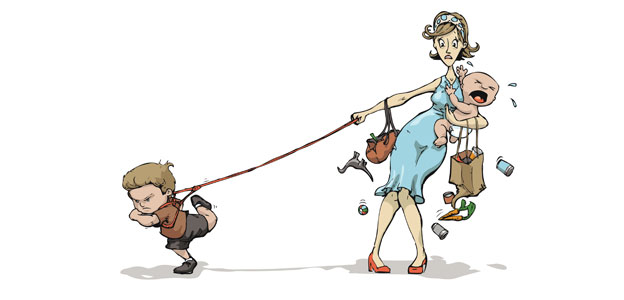SingaporeMotherhood | Parenting
November 2011
Modern Motherhood Is Stressful

A friend of mine — one of those beautiful, vivacious, gregarious, seemingly perfect-lead-a-charmed-existence kind of women who always leaves me staring after her in drop-jawed wonder — recently thought aloud about having a third child. Her husband, the ever-practical one, retorted, “Don’t you want to have your life back?” She thought about it for about half a second: kid number three is history.
The man is relived. In the early years when kids one and two were young, this woman juggled motherhood with a demanding public relations career, balanced home and boardroom, and performed her duties in both arenas with the dedication and precision of Carrie Bradshaw homing in on a pair of Manolos. Within a couple of years, she was stressed, depressed and had faded to a shadow of her former self.
[banner][/banner]
According to a 2009 report from the Pew Research Center in America, stress is a familiar companion for all mums. Up to 82 per cent of stay-at-home-mums and 86 per cent of working mums reportedly experience stress frequently.
Oh yes, the vice-like grip of stress on motherhood is solid – and increasing. “From the research I’ve seen, (mom stress) is just going exponentially up,” says Alice Domar, an assistant professor at Harvard Medical School and author of Be Happy Without Being Perfect: How to Worry Less and Enjoy Life More.
The good news: motherhood stress is a global phenomenon so you are definitely not alone. The bad news: it’s not going anywhere. Like their counterparts in America, mums in Singapore are feeling the heat, says Dr Vanessa Keleher, a Consultant at the Women’s Emotional Health Service, Department of Psychological Medicine, National University Hospital.
“The stressors start even before the baby is born,” Dr Keleher, who is also an assistant professor with the Department of Psychological Medicine at the Yong Loo Lin School of Medicine, National University of Singapore, reveals. “This is very common in Singapore society, where there is so much information out there on what is best for our children.”
Working Mums Vs SAHMS
Thanks to its prevalence in media and pop culture, the stresses of modern mums have been given a boost in mass consciousness. And it doesn’t matter whether you’re a working mum or a stay-at-home one. Both are just as strung out, reckons Dr Keleher.
For career mums it’s the guilt factor: am I doing the best for my child? Particularly for first-time working mums during the first year of baby’s life, Dr Keleher finds, there is a heightened sense of insecurity because the mother cannot spend as much time with her baby as she’d like to.
Stay-at-home-mothers do have time. But they tend to suffer from smaller finances, less social support, a heavier child care and domestic burden, and a sense of isolation and distress.
What drives these women to perfection? It’s what nature has endowed women with — the very strong programming to nurture despite what they are going through, Dr Keleher believes.
Born This Way
Experts have found that, when hit by stress, men and women respond in different ways. In women, levels of the hormone oxytocin are higher, leading to what researchers describe as the ‘tend and befriend’ behaviour. What this means: when things go nuclear, men usually engage in solo bashing sessions (read: not good for the heart). Women call their girlfriends to vent (read: women naturally seek heart-healthy de-stressing applications).
So women are genetically programmed to deal with stress better. But modern motherhood is putting more on the shoulders of women than ever before. Many women who work still retain responsibility for child care and household labour. Even when they have domestic help or nannies, these mothers are responsible for managing them. These are added stressors on top of work concerns – which are generally the only thing men have to worry about.
It’s said that women excel in the art of multitasking, but in the face of changing family structures where nuclear families reign and extended families are a rarity, opportunities for women to unburden are less. Woman’s ability to multitask, some might say, has backfired on her.
Mums Gone Wild
When the reality of motherhood turns out to be a complete disappointment, some women turn to other sources to numb the pain. A recent news report in America highlighted how stressed-out ‘supermums’ are turning to drugs and alcohol “to escape the pressures of motherhood”.
When comedian Stefanie Wilder-Taylor blogged about her alcohol addiction, other women responded saying they had the same problem. For them, naptime equals happy hour, and that little bit of liquid courage ‘helps’ them to get through the day.
“There’s a decreased sense of tolerance and resilience to deal with the issues that come up with their children and their families. Not being able to perform at their best, not being able to give every thing their 100 per cent, worries them. They don’t sleep, they get grumpy. And if they do not understand what is happening, then they don’t do anything to stop it and the vicious cycle continues,” Dr Keleher describes.
The problem has ballooned so much that in LA, where Wilder-Taylor is based, a mother-specific treatment programme called Growing Miracles has started to help pregnant women and mothers with babies up to 12 months old.
Work It Out
So what can you do if you are feeling stressed by motherhood? Dr Keleher has some advice on how you can help yourself.
#1 Be Aware
With the proliferation of parenting material out there, it’s easy to get caught up in the race to be the perfect mother. Be selective about what you read. Don’t buy into the idea of a ‘supermum’. That is counterproductive. Work on being a “good enough” mother. As a Wall Photo making its rounds on Facebook states, “There is no way to be a perfect mother… but a million ways to be a good one”.
#2 Find Friends
Motherhood stress is a collective problem. Understand that you are not the only one facing this. Access mothering forums (like SingaporeMotherhood.com), blogs, and online groups where you can share your feelings and experiences. If you can’t go out to meet other mothers easily, do it online.
#3 Have Coping Strategies
Some do it through humour. Some sit, write down their problems and solve them one by one. Some meditate. Some turn their stressors into challenges. Whatever works to calm you down and help you breathe better is your coping strategy. Remember, you don’t have to do it all by yourself. Don’t feel guilty about taking a break.
#4 Get Help
Clinically, rates of depression and anxiety in working mums have risen. Realise that you are not alone in trying to juggle everything. Get domestic help or help from friends and relatives. A counsellor will also be able to help you get things in perspective.
All content from this article, including images, cannot be reproduced without credits or written permission from SingaporeMotherhood.
Follow us on Facebook, Instagram, and Telegram for the latest article and promotion updates.







